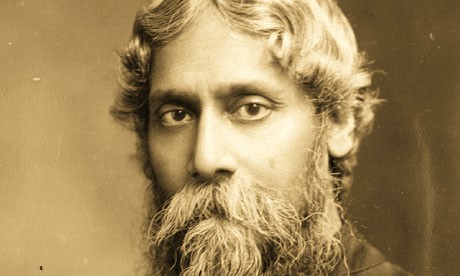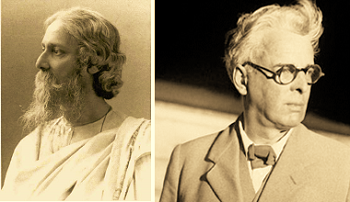Rabindranath Tagore and the Nobel – 100 Years Hence
THE POET, THE PRIZE, AND ITS PEDAGOGY
“because of his profoundly sensitive, fresh and beautiful verse, by which, with consummate skill, he has made his poetic thought, expressed in his own English words, a part of the literature of the West”- The Nobel Committee of the Swedish Academy on awarding the Nobel Prize for Literature to Sir Rabindranath Tagore.
In a low-key, near surreptitious gathering at the mansion of the Governor of Bengal, Raj Bhavan, (where press was not called, though S.B. Veda was invited and in attendance) Governor M.K. Narayanan, Harald Sandberg, Ambassador to Sweden, Susanta Duttagupta, Vice-Chancellor of Visva Bharati University, and Sabyasachi Basu Roy Chowdhury, Vice Chancellor of Rabindra Bharati University – all marked January 29th, 1914, the day that Rabindranath Tagore received his Nobel Prize Medal from Esme William Howard, 1st Baron Howard of Penrith, head of the UK diplomatic mission to the King of Sweden, who had accepted it on Tagore’s behalf in Sweden in 1913 at the awarding ceremony in Stockholm.
Tagore had not travelled to Sweden to accept it himself, so the British Envoy to Sweden came to India in the new-year to present the medal to him in a ceremony at Government House (the colonial name for Raj Bhavan).
The ceremony marking 100 years of this event, began after a sombre inauguration of a historical exhibit on the occasion by Sharmila Tagore and the cultural program, which followed was emceed by renowned actor and orator Sathinath Mukhopadhyay.
The affair had been kept low-key, perhaps, because a similar attempt to mark the centenary of Tagore’s triumph, met with controversy when President Pranab Mukherjee arrived at Visva Bharati University in Santiniketan during the prior year to mark to the occasion with great fanfare. Many experts waxed sarcastically, alluding to Tagore’s medal being stolen at Rabindra Bhavan where Mukherjee had gone to mark the occasion as being indicative of that institution’s incompetence in safeguarding its most prized material treasure.
This time, the dignitaries kept to a discussion of Rabindranath’s accomplishments. Dr. Duttagupta remarked on the relevance of Tagore in today’s world, his internationalism, his anti-nationalism, and his modern ideas. His counterpart at Rabindra-Bharati expounded on the unfortunate facts of how people in his home country, Bengal in particular, tried to minimize the accomplishment by saying that the award was won due to lobbying by Rabindranath, and that the Nobel Committee were impressed more by the translations and revisions, which were done by the Irish Poet W.B. Yeats, whose contributions to the adaptation both Rabindranath and he have acknowledged. Harald Sandberg spoke briefly about Tagore’s impact on Sweden during his two trips there in the 1920s, his sense of how cultural exchange can improve relations between countries, at a time when ‘Cricket Diplomacy’ wold be regarded in the same breath as the mutterings and utterances of a fool.
Governor Narayanan spoke on Tagore’s importance to India, 100 years after he became known in the West.
Published in 1912, ‘Song Offerings’, which was Rabindranath Tagore’s adaptation of his collection of 157 Bengali language poems, compiled in the book, ‘Gitanjali’ astounded William Butler Yeats, and he helped popularize it after it was first published by The India Society in 1913. He wrote the Introduction of the famous reprint, which was published later in the year by The MacMillan Company.
Yeats had been introduced to the work by William Rothstein, an artist, who met Rabindranath during a visit to Jorasanko, the Tagore family ancestral home, where he had gone to exchange ideas about art and learn technique from Rabindranath’s painter nephews, Gaganendranath and Abanindranath Tagore, who were stalwarts of the Bengal School of Art. But he was profoundly impressed by the mystical nature and charisma of Rabindranath, asking the poet to pose for a sketch.
Learning that the sagely and kingly Rabindranath was a poet, Rothstein read his works. Impressed, he introduced it to his friend, Yeats, who wrote the introduction to ‘Song Offerings’ as a note to Rothstein. Yeats Rothstein and Ezra Pound to whom they introduced Tagore’s writings, raved about their new ‘find’ to the literati of Europe.
Europe was going through a period of great tension at the time, on the brink of the global conflict of World War I. Starved of spirituality, Tagore’s naturalistic verses soothed the aching souls of the European artistic elite. It was not long before he was being hailed as the most profound poet ever to have lived – a wise man from the East, in the truest sense.
Events moved at a break-neck pace and, within a year, he had won the Nobel Prize, to his own amazement. Those who say that this was due to lobbying efforts by Rabindranath are certainly ignorant of the nomination process – a secret one, in which certain academic institutions and cultural delegates are empowered to nominate. The faculty at nominating institutions familiar with Tagore’s works in Europe were all British – and the British take on Tagore was ambivalent.
LEFT: RABINDRANATH TAGORE,; RIGHT: W.B. YEATS
The British certainly found in him a more appealing figure for the natives to hail, certainly, than the revolutionary Bengalis, who were attempting to eject the British by force of arms. However, his stand opposing the division of Bengal in 1905 had made him persona non grata, and British Academia were active in a campaign to prevent India’s elite from attending Tagore’s school at Santiniketan, and inherited scenic property in rural Bengal.
In fact, Tagore was on the brink of closing the doors of his school when the prize money from the Nobel, funnelled into its coffers by Tagore breathed new life into it.
To the west, he embodied the best of what the East had to offer, and came to exemplify all that the West admired about the East. To some extent, Tagore played to this sentiment, becoming more and more a figure of exoticism and mystery to Western interlocutors. Yeats, who was once floored by Tagore’s poetry, referred to his later works as “sentimental rubbish” that was “tarnishing his reputation”. No doubt,
If his words were losing their lustre with time, in his deeds, a revolutionary and principled form of nationalism was being exhibited – a dignified expression less the jingoism and tribalism observed across Europe during this period. He was assuming his role as elder Statesman in the world of letters, leader of the very Bengali intelligentsia which had sought to marginalize him when he dared deviate from the ‘chaste’ form of the language in his prose and poetry.
Unlike other Indian Nobel Prize Winners (Amartya Sen comes to mind, who ironically says Tagore was his ‘guru’ in as much as the term might be applied to his life) Rabindranath was not afraid to tell truth to the reigning monarchy. When the British banned public gatherings and Brigadier General Dyer massacred some 379 Punjabis at Jalianwallah Bag (causing 1576 casualties in total) some five and a half years after he won the Nobel, Rabindranath travelled immediately from Santiniketan to Calcutta where he tried to organize a rally in protest. The Bengali establishment had been cowed by the draconian measures of the British, signifying that the ‘example’ that Dyer had tried to make of the peaceful Punjabis was working on some level across the breadth of the sub-continent.
Determined to something radical when others were too afraid, Rabindranath Tagore, already the first non-European to win the Nobel Prize, became the only man in history to renounce a Knighthood from the British Crown. Rabindranath, scion of landed gentry, the paradoxical mystic, whose austere words had placed nature above materialism, renunciation above wealth and power, had finally lived up to the spirit of Gitanjali. People could debate the import of his words, the worthiness of his of them in garnering him the most prestigious prize offered to a man of letters – but they could not deny his actions.
Today we remember that a mere medal alone did not make Rabindranath Tagore a great man. And, the amalgam of his beautiful words as well as his principled deeds, much more so than a gold Medallion awarded by the West, ought better be considered his enduring legacy.
 The Global Calcuttan Magazine
The Global Calcuttan Magazine 
